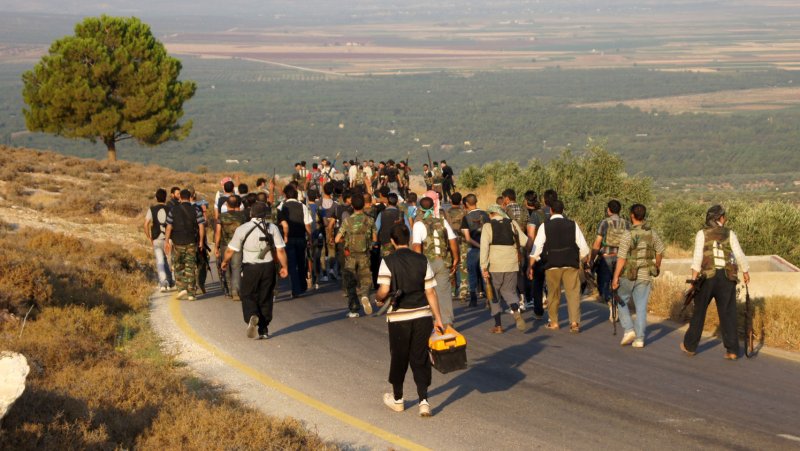Members of the Free Syrian Army hold onto their weapons as they walk on a road at Haram, near Idlib in Syria, September 1, 2012. UPI |
License Photo
ENNISKILLEN, Northern Ireland, June 18 (UPI) -- Group of Eight leaders emphasized the need for a political settlement in Syria in a statement issued Tuesday as the summit in Northern Ireland ended.
The communique referred to the Syrian civil war as "an appalling human tragedy" and pledged more aid to refugees and to the countries giving them shelter. It also condemned human rights violations and called for a U.N. investigation of whether chemical weapons have been used.
Russian President Vladimir Putin, an ally of the government of Syrian President Bashar Assad, has refused to support any aid to the Syrian rebels and has said he does not believe Assad has used chemical weapons. The G8 communique called for a conference in Geneva on Syria, which Putin backs.
Ben Rhodes, deputy U.S. national security adviser for strategic communications, told reporters on the presidential plane as President Obama flew to Berlin the United States is happy with the results of the meeting. He said negotiators worked into the early hours of Tuesday morning on the details.
"We're very pleased with the language that was agreed to on Syria, which represented a good convergence of views at the G8," Rhodes said.
He said the communique's high points include promises of $1.5 billion in additional aid, including $300 million from the United States, and the call for a speedy international conference on Syria.
We are determined to work together to stop the bloodshed and loss of life in Syria and to support the Syrian people to establish peace and stability through political means," the G8 statement said.
While Syria was the most divisive issue on the agenda, the leaders also discussed trade barriers and tax avoidance.
The final communique promised to deal with corporations and individuals moving money around the world to evade taxes. It called on the Organization for Economic Cooperation and Development to develop a model to ease the task of identifying tax evaders and punish them.
"We will work to create a common template for multinationals to report to tax authorities where they make their profits and pay their taxes across the world," the communique said.
U.S. President Barack Obama met with Putin Monday to try to persuade him to put pressure Assad to negotiate a transition, but they openly disagreed when talking to media after they met.
"Of course, our opinions do not coincide," Putin said at a joint news conference with Obama. "But all of us have the intention to stop the violence in Syria, to stop the growth of victims and to solve the situation peacefully, including by bringing the parties to the negotiations table in Geneva."
"With respect to Syria, we do have differing perspectives on the problem," Obama said. "But we share an interest in reducing the violence; securing chemical weapons and ensuring that they're neither used nor are they subject to proliferation; and that we want to try to resolve the issue through political means, if possible.
"And so we have instructed our teams to continue to work on the potential of a Geneva followup to the first meeting," Obama said.
Five principles discussed during dinner Monday included providing humanitarian aid; actions to combat extremist elements, declaring that use of chemical weapons is unacceptable, preparing for stabilization efforts following a change of government and discussing transitioning to a new executive authority in Syria, the Times said.















